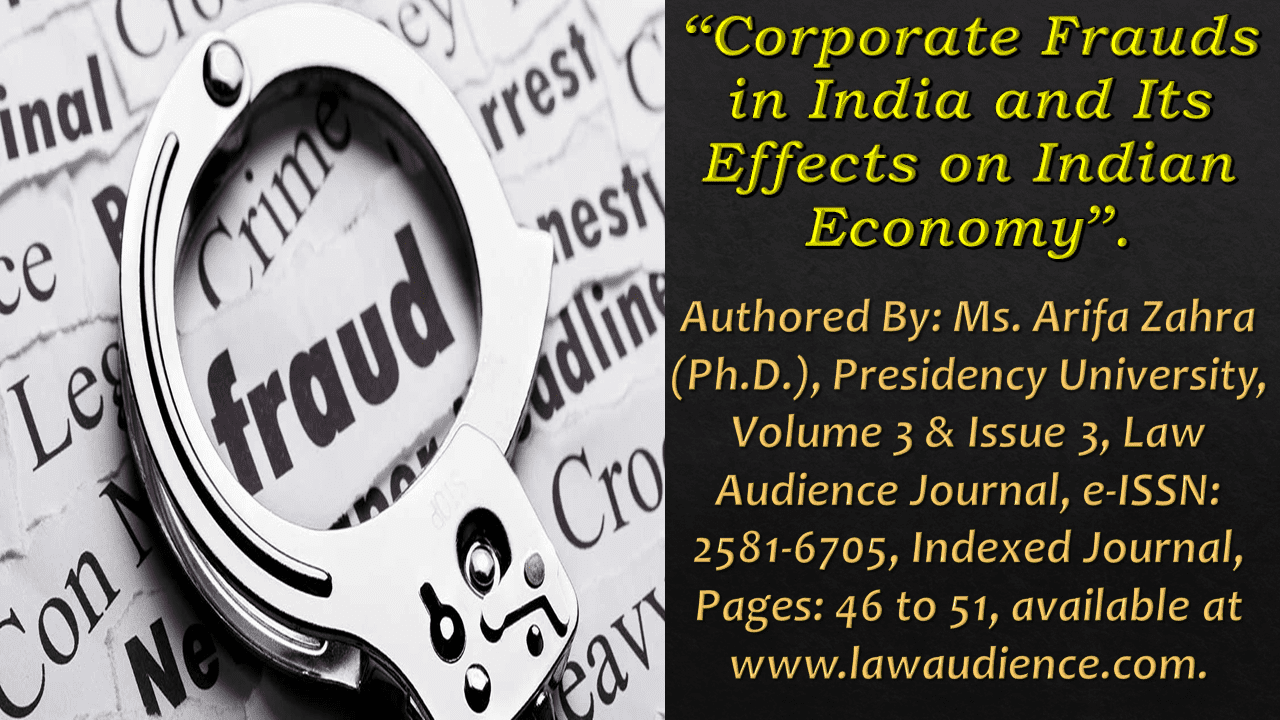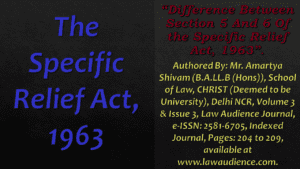Click here to download the full paper (PDF)
Authored By: Ms. Arifa Zahra (Ph.D.), Presidency University,
Click here for Copyright Policy.
“FRAUS OMNIA VITIATE”
ABSTRACT:
In the present research paper, researcher aims to highlight the corporate scams and the toll which Indian economy has to pay due to the malfunctioning and the intentional frauds in the Indian market. Since the Enron scam and the House loan Bubble in USA, all the countries were at high alert and various schemes and committees were formed to check the internal management of the corporate structure in the State’s territories. Researcher aims to answer the following questions:
- Irrespective of regulatory authorities and the procedural laws, how do the companies and its employees manage to commit frauds costing billions of dollars to the economy in the country?
- Should India approach the harsher policies while checking the audit and accounts of the companies?
Also, researcher frames the following hypothesis to carry on the research on the aforesaid topic:
- Corruption in the government authorities responsible for the financial management of the country is liable for the constant frauds in the Indian
- Privatization and the nationalization approaches should be strictly adhered to which unfortunately in India remained in a dormant.
“In a way, fraud in business is no different than the infidelity in marriage or plagiarism in a scholarly work. Even people committed to high moral standards succumbed.” ~ By Miroslav Volf.
I. INTRODUCTION:
Scams like 2G Spectrum, Satyam Scandal and Kingfisher Airlines are well known in India and it has led to the violation of the rights of the investors. Even such scams have led to the fall in the growth of the FDI in India for several years as it did pose a threat to the foreign investors. The financial market in India is at a very high risk where the principle of corporate veil is strictly followed. The practices like Insider Trading became very common and as a result, SEBI had to bring an amendment to the SEBI, 1992 to penalize the offender with higher monetary penalty[1].
II. CASE STUDIES:
II.I CASE STUDY OF 2G SPECTRUM:
It is not a hidden fact that the corruption in the financial market leads to the unfair competition. On this point, the case study of the 2G Spectrum is vital which shook the Indian economy to an extent that it was considered to be the 2nd biggest scam in the journal of Wall Street after Water Gate Scam and the boldly corrupted scam in the independent India wherein the executives of the Indian government were involved. For the sale of the 2G spectrum as any other natural resource, India has two ways either to sale by auction or by fixed price on first come first serve basis. At that time, the Communication and the IT Minister A. Raja alleged to have issued 122 licenses for the spectrum by favoring a few companies and by preponing the date for the submission of the cheques (on first come first serve basis) from 5th of October, 2008 to 5th of September, 2008 which led to the chaos in the market and only those companies could gain the benefit who were prepared with the cheques.
After A.Raja, Kappil Sibal was appointed as the Communication and the IT Minister who revealed that there is no loss occurred to the Indian economy due to the procedure followed by A. Raja. However, Subramanian Swami made an official criminal complaint against A. Raja in the year 2010 before SC, wherein it was said that A. Raja was given 3000 Crores bribe to prepone the date and the prices of the 2G Spectrum were exactly same as in 2001. Companies like Unitech Wireless, Swan Telecom, TATA Teleservices were penalized with 5 Crores each. However, on 5th of December, 2017, Supreme Court discharged all the accused including A. Raja and considered the alleged claims baseless[2].
II.II CASE STUDY OF SATYAM SCANDAL:
On 7th of Jan, 2009, Ramalinga Raju confessed in a letter to the Bombay Stock Exchange, that he along with his relatives and employees has been committing a fraud of 710036 Crores since 2001. The letter was a bombshell on the investors and the employees which resulted in the crash of the market price of the Satyam Stock from 178 Rs before the scam to 41 Rs after the scam on the same day leading to the loss to 53000 investors.
In his confession letter, Ramalinga Raju said that “It was like riding a tiger without knowing how to get off without being eaten”. The scam occurred due to the fabrication of 7561 Invoices for 4782.75 Crores, between April 2003 and September 2008. The act was the desperate desire to match up with the leading market leaders like Infosys and WIPRO. The company was handed over to the committee headed by Deepak Parikh along with Karin Carnae and was subsumed by Mahindra in less than three months of its rescue process. The class action suit in US was filed which was adjusted by paying huge amount[3].
The case was more of connivance rather than the negligence by the auditors in the company and hence the market regulator SEBI amended the Corporate Governance Code and Companies Act, 2013. In India, rotation of the auditors and the mandatory declaration of shares pledged by the promoters of the company were introduced[4]. Ramalinga Raju was penalized with 7 years of the imprisonment and 5 Crores each. This seems a lot less when we see the Enron offender Jeff Skilling imprisonment for the period of 24 years and Berniee Madoff for the period of 150 years imprisonment for Ponzi Scheme in USA.
II.III CASE STUDY OF VIJAY MALIYA:
The most important case study in the present research paper is the life and the scam by Vijay Maliya. In 1983, he was appointed as the CEO of the United Breweries after the demise of his father. He was just 28 years old and it is said that he became addicted to the royal lifestyle and he never compromised on his whims. He was known as the “king of the good times”. In 2005, Kingfisher Airlines were opened by UB group. It was considered to be the royal airline providing royal treatment to the passengers of all classes without any class system. In 2007, Air Deccan was bought by Maliya which ultimately led to the loss to the Kingfisher Airlines as there was no vivid profit in the routes where the airlines travelled. There was constant loss to the Airlines which led to the non- payment of the salaries to the employees.
The debt which Kingfisher’s Vijay Maliya owes to the total 17 banks in India is 9000 Crores. He fled the country when this brought to the public knowledge. His assets, accounts and house in Goa have been seized by the government of India[5]. What he said was “the loss occurred due to the changing economic schemes in India and he does not owe any amount to any bank. Blaming Media for his condition, Maliya said that he suffered the loss of 4000 Crores and no one is accountable for that. It was the epic case of Non-Performing Asset and a huge loss to the banks like SBI and IDBI.
III. CORPORATE SCAMS AND EFFECTS ON INDIAN ECONOMY:
India has been ranked 80th in the Corruption Perception Index by Transparency International in the year 2020. It includes all the corporate, political and social spams and scams in India. Corporate frauds are considered as the inevitable byproduct of the growth in the Indian economy. The desperation has led the fraudster to ditch thousands of genuine investors and the government.
One of the reasons for the constant growing number of frauds is the illiteracy amongst the investors and the genuine citizens who are not interested in knowing the business complexities happening behind the corporate veil. For example in 2008, the financial ideal Credit Default Swap was such a foreign and complex product which ultimately led to the financial crises. Indian people are mostly interested in making money out of money without going into the detail how the technicalities would make money out of money and hence most of them fall for the ponzi schemes and insurance scandals.
Also, with the advancement of the technology, the global barriers have been broken and it has become very easy to defraud via spams. It considerably has an inevitable adverse impact on the Indian economy as the frauds posed a serious threat to the foreign investors.
Also, the vivid effect of the corporate scams can be bulk of amendments to the laws in India retrospectively. From the Companies Amendment Act of 2013 to the introduction of the Insolvency Code 2016 and from time to time, the enactment of Rules and policies by the market regulator, SEBI and RBI, the frauds have been tried to be stopped but again it is the human attribute of greed which leads to the corruption in the corporate world[6].
IV. CONCLUSION:
In the research, researcher already answered the research questions as to the scams irrespective of the mandatory laws in India and India should develop harsher approach to penalize the culprits involved in the scams in order to protect the genuine investors and common man’s hard-earned money.
After highlighting the case study of major scams in India, researcher comes to the crux that the hypothesis as to the “Corruption in the government authorities responsible for the financial management of the country is liable for the constant frauds in the Indian economy” stands correct and affirmative. As it was seen in the 2G Spectrum, the executives were involved in the scam. Thus, saying that government itself is responsible for conniving with the culprit isn’t wrong.
As far as the second hypothesis is concerned, “Privatization and the nationalization approaches should be strictly adhered to which unfortunately in India remained in a dormant stage”– Researcher says that strict adherence to the economic policies of the government does not allow the private sectors to maintain the confidentiality to their corporate affairs and there is always the shadow of the transparency to the transactions. If, inventive-preneurship and entrepreneurship is to be promoted than strict distinction is to be made in between privatization and nationalization of the entity. Hence, second hypothesis stands correct and affirmative.
Cite this article as:
Arifa Zahra, Corporate Frauds in India and Its Effects on Indian Economy, Vol.3 & Issue 3, Law Audience Journal (e-ISSN: 2581-6705), Pages 46 to 51 (9th January 2022), available at https://www.lawaudience.com/corporate-frauds-in-india-and-its-effects-on-indian-economy/.
Footnotes & References:
[1] SEBI Act, 1992, Article 15G- If any insider who,— (i) either on his own behalf or on behalf of any other person, deals in securities of a body corporate listed on any stock exchange on the basis of any unpublished price-sensitive information; or (ii) communicates any unpublished price-sensitive information to any person, with or without his request for such information except as required in the ordinary course of business or under any law; or (iii) counsels, or procures for any other person to deal in any securities of anybody corporate on the basis of unpublished price-sensitive information, shall be liable to a penalty 81[which shall not be less than ten lakh rupees but which may extend to twenty- five crore rupees or three times the amount of profits made out of insider trading, whichever is higher].
[2] Robin Banerjee, Who Cheats and How? Scams, Fraud and the Dark Side of the Corporate World 69 (SAGE Publications, 2015).
[3] Jayant Umranikar, Prevention, Detection & Investigation Of Corporate Frauds 59 (Wolters kluwer india Pvt Ltd, 2019).
[4] Companies (Audit and Auditors) Rules 2014, Section 139(2) and Rule 5- Maximum term for appointment of auditors 1- In case of every listed company; 2. All Unlisted companies having paid up share capital of Rs 10 Crore or more;’ 3. All Private companies having paid up share capital of Rs 50 crore of more; 4 All companies having borrowings from financial institutions, banks or public deposit of Rs 50 Crore or more shall appoint or reappoint- a. an Individual more than one term of 5 Consecutive years; b. An Audit firm as auditor for more than 2 terms of 5 consecutive years;
[5] Maryam Hussain, Corporate Fraud The Human Factor 46 (Bloomsbury USA, 2014).
[6] Robin Banerjee, Who Cheats and How? Scams, Fraud and the Dark Side of the Corporate World 28 (SAGE Publications, 2015).



